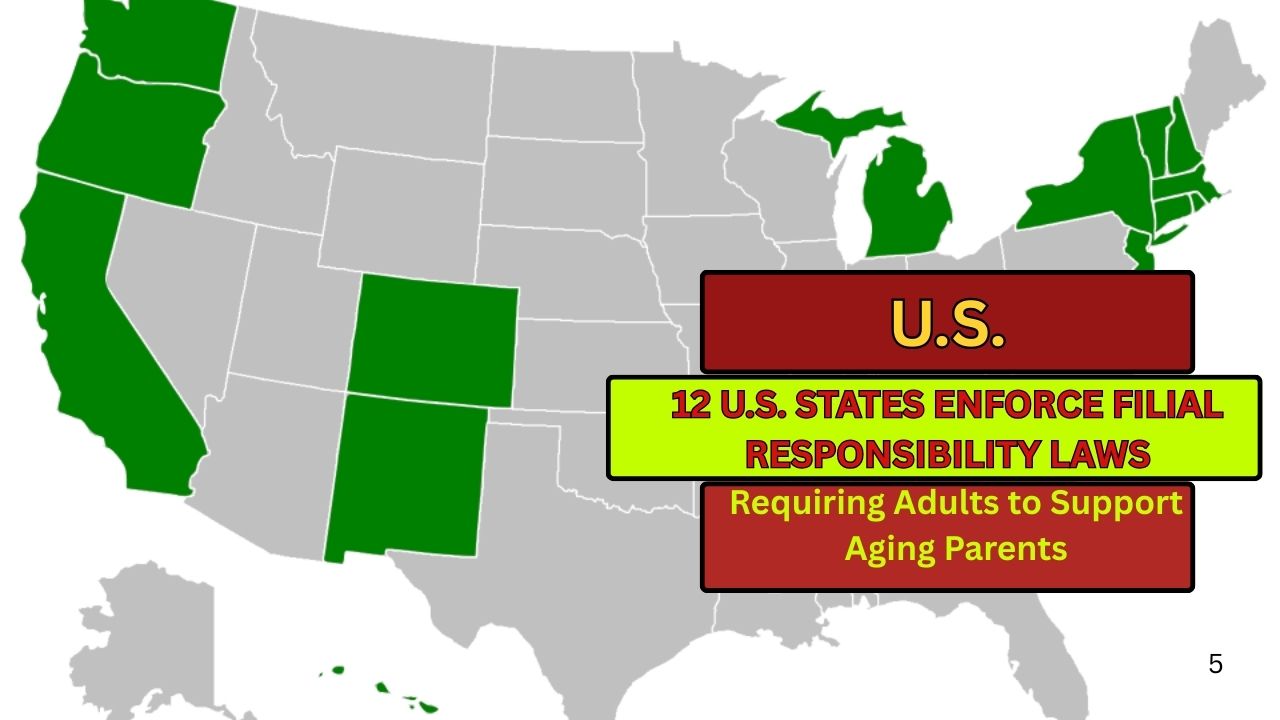In a surprising fact few Americans are aware of, several U.S. states have laws that make it a legal obligation for adult children to support their indigent parents. These are known as filial responsibility laws, and while they are not often enforced, they still exist in over half the country.
Filial responsibility laws have deep historical roots, tracing back to the Elizabethan Poor Law of 1601, which aimed to reduce the burden on public welfare systems by requiring family members to care for one another. In the U.S. today, 26 states and Puerto Rico have such laws on the books. However, the focus often falls on about 12 states where enforcement or significant legal cases have brought these laws into the public eye.
Which States Have Filial Responsibility Laws?
As of 2025, the states that maintain filial responsibility laws include:
- Alaska
- Arkansas
- California
- Connecticut
- Delaware
- Georgia
- Indiana
- Kentucky
- Louisiana
- Massachusetts
- Mississippi
- Montana
- Nevada
- New Hampshire
- New Jersey
- North Carolina
- North Dakota
- Ohio
- Oregon
- Pennsylvania
- Rhode Island
- South Dakota
- Tennessee
- Utah
- Vermont
- Virginia
- West Virginia
You can view an updated list and the specific statutes through trusted resources like Legal Information Institute (Cornell Law School) and Wikipedia’s page on Filial Responsibility Laws.
How These Laws Work
In general, these laws require adult children to provide necessities like food, shelter, and medical care for parents who cannot support themselves. The exact requirements and thresholds vary from state to state. Some laws even allow healthcare providers or nursing homes to pursue the children of elderly patients for unpaid bills.
It’s important to note, however, that many states rarely enforce these laws. Most cases arise when an elder care institution seeks repayment for services rendered.
A major case that put these laws into the spotlight occurred in Pennsylvania in 2012. In Health Care & Retirement Corporation of America v. Pittas, John Pittas was held liable for his mother’s $93,000 nursing home bill after she fled the country..
Similarly, in North Dakota, a man was forced to pay over $100,000 for his parents’ medical debts after it was proven that assets were fraudulently transferred to him to avoid creditor claims.
What Happens If You Don’t Comply?
The consequences can vary. In some states like North Carolina, refusal to support an indigent parent could be classified as a misdemeanor offense. In others, civil lawsuits can be filed against adult children. Penalties may include wage garnishments, liens on property, or court-ordered repayments.
For example, if an elderly parent fails to qualify for Medicaid and cannot pay for long-term care, their children might be financially responsible under these statutes.
Why These Laws Still Matter Today
Even though these laws are not heavily enforced, demographic shifts and rising long-term care costs could increase their importance in the future. America’s aging population, combined with strains on Medicaid, could push more care institutions to explore legal options against family members.
Moreover, the federal government’s Medicaid guidelines emphasize personal and family responsibility before public assistance kicks in, aligning philosophically with these state-level laws.
How To Prepare
If you live in one of these states or have aging parents, it’s wise to:
- Consult an Elder Law Attorney: They can offer tailored advice and strategies to protect your finances.
- Purchase Long-Term Care Insurance: This can significantly ease future financial burdens.
- Have Open Family Discussions: Understand your parents’ financial situation early to plan accordingly.
By being proactive, you can avoid unexpected legal battles and ensure that everyone’s needs are appropriately met.
This article has been carefully fact-checked by our editorial team to ensure accuracy and eliminate any misleading information. We are committed to maintaining the highest standards of integrity in our content.

Outside of work, he enjoys playing chess, following cricket, and writing short stories. His commitment to integrity and in-depth analysis strengthens OTE News’ mission of providing trustworthy journalism.




